Filter by
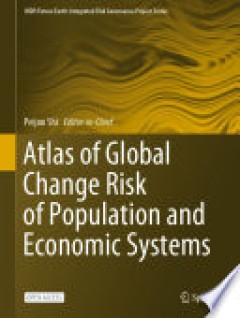
Atlas of global change risk of population and economic systems
This book is open access and illustrates the spatial distribution of the global change risk of population and economic systems with the maps of environment, global climate change, global population and economic systems, and global change risk. The risks of global change are mapped at 0.25 degree grid unit. The risk results and their contribution rates of the world at national level are unpreced…
- Edition
- -
- ISBN/ISSN
- 9789811666919
- Collation
- XXII, 278 p
- Series Title
- -
- Call Number
- 363.73874 SHI a
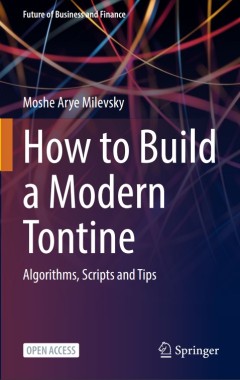
How to Build a Modern Tontine : Algorithms, Scripts and Tips
This open access book introduces the modern tontine and its applications in retirement and decumulation. Personal financial management in the later stages of life presents unique challenges, and renowned retirement planning expert Dr. Milevsky proposes the modern tontine as a solution. With the goal of guiding professionals and retirees in more efficient decumulation, the book demonstrates how …
- Edition
- -
- ISBN/ISSN
- 9789811640957
- Collation
- XXI, 156 p ; ill
- Series Title
- -
- Call Number
- 368.32 HOW
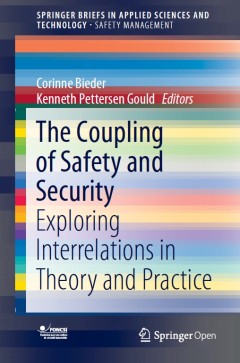
The coupling of safety and security : exploring interrelations in theory and …
This open access book explores the synergies and tensions between safety and security management from a variety of perspectives and by combining input from numerous disciplines. It defines the concepts of safety and security, and discusses the methodological, organizational and institutional implications that accompany approaching them as separate entities and combining them, respectively. T…
- Edition
- -
- ISBN/ISSN
- 9783030472290
- Collation
- viii, 113p. : ill.
- Series Title
- -
- Call Number
- 363.11 COU c
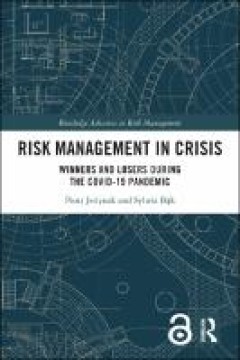
Risk management in crisis : winners and losers during the COVID-19 pandemic
Risk management is a domain of management which comes to the fore in crisis. This book looks at risk management under crisis conditions in the COVID-19 pandemic context. The book synthesizes existing concepts, strategies, approaches and methods of risk management and provides the results of empirical research on risk and risk management during the COVID-19 pandemic. The research outcome was bas…
- Edition
- -
- ISBN/ISSN
- 9781000457261
- Collation
- x, 241 p.; ill
- Series Title
- -
- Call Number
- 658.155 JED r
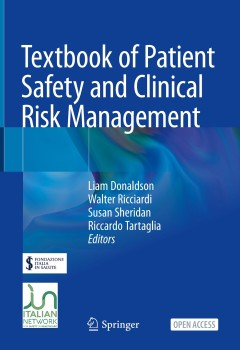
Textbook of patient safety and clinical risk management
Implementing safety practices in healthcare saves lives and improves the quality of care: it is therefore vital to apply good clinical practices, such as the WHO surgical checklist, to adopt the most appropriate measures for the prevention of assistance-related risks, and to identify the potential ones using tools such as reporting & learning systems. The culture of safety in the care enviro…
- Edition
- -
- ISBN/ISSN
- 9783030594039
- Collation
- xiii, 496p. : ill.
- Series Title
- -
- Call Number
- 616 TEX t

Corporate ethics for turbulent markets: the market context of executive decis…
Corporate executives immersed in the turbulent markets of today face a world not of clear cut moral dilemmas such as right or wrong, or good or evil, but instead must confront large corporate grey areas of lesser good, lesser evil, less true, less unfair, and less unjust. Often these choices become almost indistinguishable. Corporate Ethics for Turbulent Markets: Executive Response to Market Ch…
- Edition
- First edition.
- ISBN/ISSN
- 9781787561915
- Collation
- viii, 320 pages ; 24 cm
- Series Title
- Corporate ethics for turbulent markets
- Call Number
- 174.4 MAS c
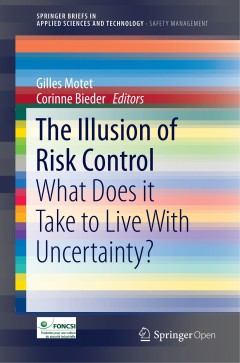
The illusion of risk control : what does it take to live with uncertainty?
This book explores the implications of acknowledging uncertainty and black swans for regulation of high-hazard technologies, for stakeholder acceptability of potentially hazardous activities and for risk governance. The conventional approach to risk assessment, which combines the likelihood of an event and the severity of its consequences, is poorly suited to situations where uncertainty and am…
- Edition
- -
- ISBN/ISSN
- 9783319329390
- Collation
- v, 112p. : ill.
- Series Title
- -
- Call Number
- 658.155 ILL i
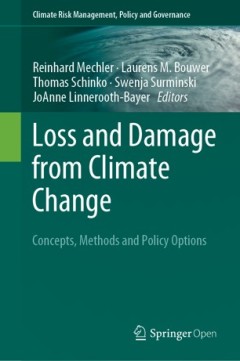
Loss and damage from climate change : concepts, methods and policy options
This book provides an authoritative insight on the Loss and Damage discourse by highlighting state-of-the-art research and policy linked to this discourse and articulating its multiple concepts, principles and methods. Written by leading researchers and practitioners, it identifies practical and evidence-based policy options to inform the discourse and climate negotiations. With climate-rela…
- Edition
- -
- ISBN/ISSN
- 9783319720265
- Collation
- xxii, 557p. : ill.
- Series Title
- -
- Call Number
- 577.27 LOS l
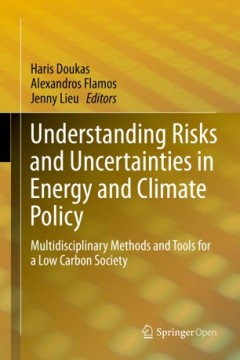
Understanding risks and uncertainties in energy and climate policy : multidis…
This open access book analyzes and seeks to consolidate the use of robust quantitative tools and qualitative methods for the design and assessment of energy and climate policies. In particular, it examines energy and climate policy performance and associated risks, as well as public acceptance and portfolio analysis in climate policy, and presents methods for evaluating the costs and benefits o…
- Edition
- -
- ISBN/ISSN
- 9783030031527
- Collation
- xvi, 259p. : ill.
- Series Title
- -
- Call Number
- 333.79 UND u
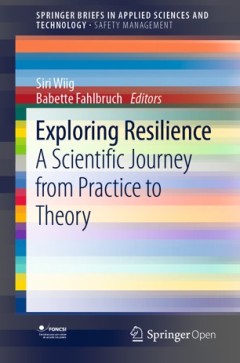
Exploring resilience : a scientific journey from practice to theory
Resilience has become an important topic on the safety research agenda and in organizational practice. Most empirical work on resilience has been descriptive, identifying characteristics of work and organizing activity which allow organizations to cope with unexpected situations. Fewer studies have developed testable models and theories that can be used to support interventions aiming to increa…
- Edition
- -
- ISBN/ISSN
- 9783030031893
- Collation
- vi, 128p. : ill.
- Series Title
- -
- Call Number
- 363.11 EXP e
 Computer Science, Information & General Works
Computer Science, Information & General Works  Philosophy & Psychology
Philosophy & Psychology  Religion
Religion  Social Sciences
Social Sciences  Language
Language  Pure Science
Pure Science  Applied Sciences
Applied Sciences  Art & Recreation
Art & Recreation  Literature
Literature  History & Geography
History & Geography